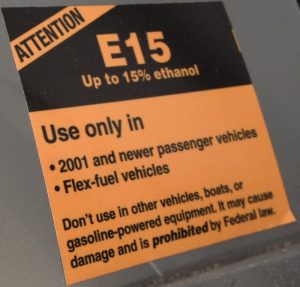
U.S. Rep. Kristi Noem (R-SD) this week commended an announcement by the president that the Environmental Protection Agency (EPA) will start lifting restrictions on year-round sales of E15 fuel, which the congresswoman says would benefit farmers in South Dakota and elsewhere around the country.
“To stabilize the ag economy, we need to expand market access, and ethanol is a huge market that, because of federal regulations, we’ve been unable to fully tap into,” Rep. Noem said following U.S. President Donald Trump’s directive that the EPA will start a rulemaking process to allow for the year-round use of 15 percent ethanol blends.
“I am grateful that he has followed through on this promise to the American people,” said Rep. Noem.
Known as E15, the fuel is a higher-octane fuel composed of 15 percent ethanol and 85 percent gasoline. E15 received EPA approval in 2012 for use in model year 2001 and newer cars, light-duty trucks, medium-sized SUVs, and all flex-fuel vehicles, according to the Renewable Fuels Association, which says E15 is available at retail fueling stations in 28 states.
Rep. Noem has repeatedly pushed to expand that decision and end what she has called unnecessary limitations on E15 to help farmers and the agricultural economy, while reducing consumer spending and the nation’s reliance on foreign oil.
“President Trump and I have had many conversations about the expansion of E15,” said Rep. Noem. “He knows where I stand, and that I wouldn’t give up on this issue until we made it right for farmers in South Dakota and for consumers who are demanding more affordable, homegrown fuels.”
U.S. Rep. Darin LaHood (R-IL) also applauded the president for recognizing the importance of ethanol sales for farmers in the Midwest.
“Ethanol sales help drive demand for corn in Illinois and the announcement … will broaden opportunities for our farmers looking to sell more E15,” said Rep. LaHood. “Not only will the expansion of E15 sales benefit our farmers in central and west-central Illinois, but this will provide fuel retailers and consumers with more cost-efficient choices that reduce gas emissions into our environment.”
Several stakeholders also are thrilled about the president’s Tuesday announcement.
“We appreciate the key role Congresswoman Noem played in getting us to this point, particularly as a chair of the Congressional Biofuels Caucus and as a strong supporter of renewable fuels,” said Emily Skor, CEO of Growth Energy. “This announcement is great news for farmers, biofuel workers, retailers and consumers everywhere who want to enjoy cleaner, more affordable options at the fuel pump.”
Scott VanderWal, president of the South Dakota Farm Bureau, also praised Rep. Noem for her leadership in Congress, particularly for her efforts to help “the administration understand the importance of increasing market access for agricultural products,” he said. “The best way out of the current poor ag economy is to find new markets and expand existing ones.”
Also thanking Rep. Noem for being a biofuels champion in Washington, D.C., was Jeff Broin, chief executive officer of POET LLC, a leading producer of biofuels and coproducts based in Sioux Falls, S.D.
“This is a historic directive – not only for our farmers, but for the nation as a whole,” Broin said. “The move to E15 will provide consumers with the choice to fill up with low-cost, high-performance fuel year-round, while improving air quality in our country’s largest cities.”
Lisa Richardson, executive director of South Dakota Corn, called the president’s announcement on Oct. 9 “an exciting day for corn producers.”
“I would like to thank Representative Noem for her continuous advocacy with President Trump on behalf of South Dakota producers,” she said. “We welcome this announcement and the opportunity to supply more of our nation’s fuel supply.”
The EPA’s formal rulemaking process to finalize the E15 change will take several months, a fact further fortified by opponents like those in the oil industry who have said they’ll sue, arguing that removing E15 from federal air pollution requirements requires action from Congress, not the EPA.



